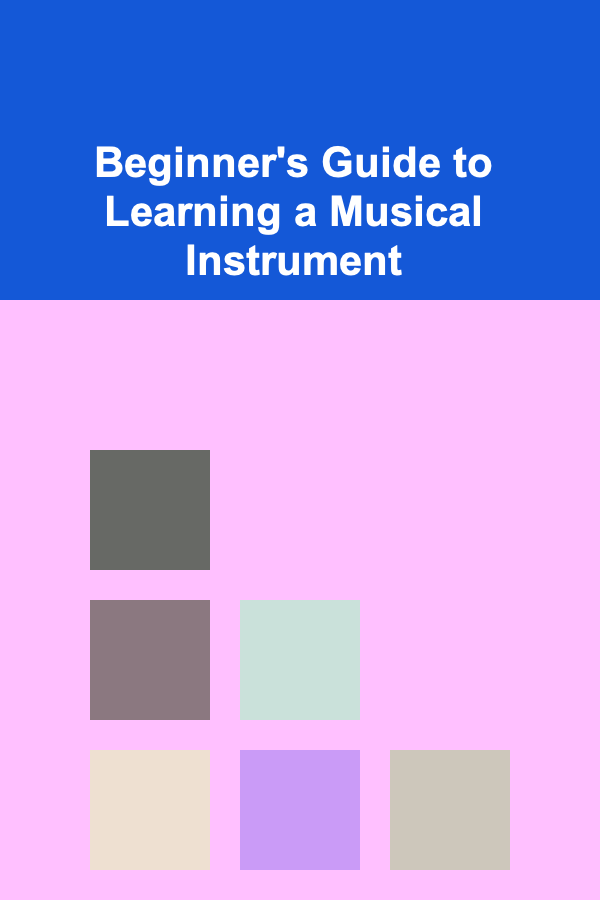
Beginner's Guide to Learning a Musical Instrument
ebook include PDF & Audio bundle (Micro Guide)
$12.99$11.99
Limited Time Offer! Order within the next:

Learning a musical instrument can be an incredibly rewarding experience. Whether it's for personal enjoyment, professional development, or simply as a creative outlet, playing an instrument offers numerous cognitive, emotional, and social benefits. However, for beginners, the journey can feel overwhelming, especially with the multitude of instruments to choose from, and the varied techniques and theory involved.
This guide is designed to help you navigate your journey from being a complete beginner to a more experienced musician. We'll break down the steps involved, offer tips, and provide useful resources to help you succeed.
Choose the Right Instrument for You
One of the most important decisions you'll make is selecting the instrument that resonates with you the most. Your choice will shape your musical journey, and while it's always possible to switch instruments later, starting with the right fit can make your learning process much smoother and more enjoyable.
Considerations for Choosing an Instrument
- Personal Preference: What kind of music do you enjoy? Different instruments lend themselves to different styles. If you're drawn to classical music, the piano or violin might be a good choice. For rock or pop, the guitar or drums might be more appealing.
- Physical Characteristics: Some instruments require more physical strength or dexterity than others. The guitar, for example, requires finger strength and coordination, while the piano relies more on hand-eye coordination.
- Budget: Instruments vary widely in price. While some, like the ukulele, are quite affordable, others, such as pianos or stringed instruments like cellos, can be expensive. Factor in the cost of the instrument, accessories (strings, picks, reeds, etc.), and maintenance (like tuning).
- Space and Portability: Think about whether you have the space for an instrument and whether it's portable. A full-sized piano, for example, requires significant space, while a guitar can be taken anywhere.
- Sound and Enjoyment: At the end of the day, you'll need to enjoy the sound your instrument makes. Spend some time listening to different instruments to determine what resonates with you emotionally.
Popular Beginner Instruments
- Piano: Ideal for beginners due to its visual simplicity (the keys) and its role in developing basic music theory understanding. It's great for all genres and offers a strong foundation for learning other instruments.
- Guitar: Offers versatility, is used in many genres, and has a relatively low cost of entry. However, it can be tough on the fingers at first.
- Violin: Good for those interested in classical music. It requires patience and consistent practice due to its lack of frets and the need for precise finger placement.
- Drums: For those with rhythm at their core, drums offer an engaging and physical approach to music. They also require significant coordination between the limbs.
- Flute/Clarinet/Saxophone: These wind instruments are great for those interested in learning music theory and are often used in both orchestral and jazz settings.
Set Realistic Goals and Expectations
Learning any instrument requires patience and perseverance. As a beginner, it's essential to set realistic goals to avoid frustration and keep your motivation high. You won't become an expert overnight, but with dedication and practice, progress will be tangible.
Short-Term Goals
- Learning the Basics: The first few weeks or months will be all about familiarizing yourself with the instrument, learning how to hold it correctly, and understanding its basic mechanics.
- First Songs: Once you've learned a few chords (if applicable), aim to play simple songs. This can be an exciting milestone that keeps you engaged and encourages continued practice.
- Proper Technique: In your early stages, focus on building proper posture, hand positioning, and technique. This will form the foundation for more advanced skills.
Long-Term Goals
- Skill Development: Over time, your goals will evolve as you become more comfortable with your instrument. You may aim to play more complex pieces, improve your speed, or learn new techniques.
- Music Theory: As you progress, you should aim to understand the basics of music theory, such as scales, intervals, chords, and key signatures. This will deepen your understanding and make learning new music easier.
- Performance: If you're interested in performing, whether in front of an audience or recording, this can be a long-term goal to work toward.
Commit to Consistent Practice
Consistent practice is the key to making progress on any musical instrument. The more you practice, the better you'll get, and the faster you'll improve. However, it's important to practice smart, not just hard.
Practice Tips for Beginners
- Set a Routine: Schedule your practice sessions at regular times. Even 20 to 30 minutes a day can lead to noticeable progress, but consistency is key.
- Warm Up: Start your practice sessions with warm-up exercises. These help with flexibility, finger dexterity, and muscle memory. For example, scales or simple finger exercises are great warm-ups.
- Focus on Technique: Avoid the temptation to rush into playing songs. Instead, spend time focusing on the fundamentals---how you hold the instrument, finger placement, posture, etc. Proper technique at the start will pay off in the long run.
- Slow and Steady: If you're working on a new piece or technique, don't try to play at full speed right away. Slow practice allows you to concentrate on accuracy, which is essential before speeding up.
- Use a Metronome: A metronome is a great tool for developing timing and rhythm. Start slow and gradually increase the speed as you become more confident.
Tracking Progress
- Record Yourself: Occasionally, record yourself playing and compare your progress over time. It will help you hear improvements and identify areas that need attention.
- Celebrate Small Wins: Break down larger pieces into smaller sections, and celebrate completing each part. This helps maintain motivation.
Learn the Basics of Music Theory
Music theory is the foundation of all music and will help you understand how to read, write, and interpret music. It also makes learning new pieces much easier.
Key Concepts in Music Theory
- Notes: Understanding the names of the notes and where they are located on your instrument is the first step in reading and playing music.
- Scales: A scale is a series of notes in a specific order. The most common scale is the major scale, which consists of seven notes. Learning scales will help you build finger strength and familiarity with your instrument's layout.
- Chords: A chord is a combination of notes played together. Major and minor chords are the basic building blocks of most songs.
- Rhythm: This involves understanding the time signature, note duration (whole, half, quarter notes), and how they fit into a piece of music. Rhythmic accuracy is critical for all instruments.
Find a Teacher or Use Online Resources
While self-learning is possible, having a teacher can dramatically speed up your progress. A teacher can correct mistakes early, teach proper technique, and guide you through the learning process.
In-Person Lessons
- Personalized Guidance: A teacher can tailor lessons to your needs and provide immediate feedback. This is especially valuable for beginners who might struggle to learn on their own.
- Accountability: Regular lessons can help you stay motivated and on track, with built-in goals and expectations.
Online Learning Resources
- YouTube: Many musicians post tutorials for beginners. Channels like JustinGuitar (for guitar) or PianoVideoLessons (for piano) can help you get started.
- Apps: There are apps like Yousician and Simply Piano that offer interactive lessons and feedback.
- Books: Books on music theory or specific instruments can provide structured learning. Look for beginner-friendly resources with clear explanations and exercises.
Stay Motivated and Enjoy the Journey
Learning an instrument can be challenging, but it's important to keep things in perspective. There will be moments of frustration, but these are part of the learning process. Celebrate your progress and enjoy the small victories along the way.
Tips to Stay Motivated
- Play Songs You Love: Learning songs that resonate with you emotionally can keep you excited about practicing.
- Join a Community: Online communities or local music groups can offer support and motivation. Sharing your progress with others can also keep you accountable.
- Challenge Yourself: As you improve, set new, slightly more challenging goals to keep pushing yourself. It can be learning a new song, mastering a new technique, or playing with others.
Conclusion
Learning a musical instrument is an enriching pursuit that offers lifelong benefits. By choosing the right instrument, setting realistic goals, practicing consistently, and understanding the basics of music theory, you'll lay a solid foundation for your musical journey. The key is patience, persistence, and most importantly, enjoying the process. Keep playing, keep practicing, and you'll find yourself growing as a musician in ways you never imagined!
Reading More From Our Other Websites
- [Organization Tip 101] How to Use Trellises for Vertical Plant Growth
- [Tie-Dyeing Tip 101] DIY Dreamscape: Step-by-Step Tie-Dye Patterns for the Perfect Pillowcase
- [Home Holiday Decoration 101] How to Embrace Minimalist Holiday Decor for a Calm and Cozy Home
- [Home Soundproofing 101] How to Soundproof with Rubber Matting: Cost-Effective Noise Control for Floors
- [Home Storage Solution 101] How to Store and Organize Your Home's Cleaning Supplies
- [Organization Tip 101] How to Incorporate Hooks for Hanging Clothes and Accessories
- [Home Budget Decorating 101] How to Incorporate DIY Decor into Your Home Without the Stress
- [Organization Tip 101] How to Organize Reference Materials and Non-Fiction Books
- [Organization Tip 101] How to Create a Routine for Regular Equipment Maintenance
- [Home Budget Decorating 101] How to Decorate a Small Apartment Without Overwhelming the Space

How to Make Money Online as an Archivist: 10 Actionable Ideas
Read More
How to Organize Your Home Library for Easy Access to Books
Read More
The Mechanical Engineer's Guide: Mastering Design, Analysis, and Innovation
Read More
Ultimate Guide to Utilizing Public Wi-Fi for Internet Access While Traveling
Read More
How to Specialize: Choosing a Niche as a Veterinary Technician
Read More
How to Upcycle Old Wrapping Paper into Festive Decorations
Read MoreOther Products

How to Make Money Online as an Archivist: 10 Actionable Ideas
Read More
How to Organize Your Home Library for Easy Access to Books
Read More
The Mechanical Engineer's Guide: Mastering Design, Analysis, and Innovation
Read More
Ultimate Guide to Utilizing Public Wi-Fi for Internet Access While Traveling
Read More
How to Specialize: Choosing a Niche as a Veterinary Technician
Read More